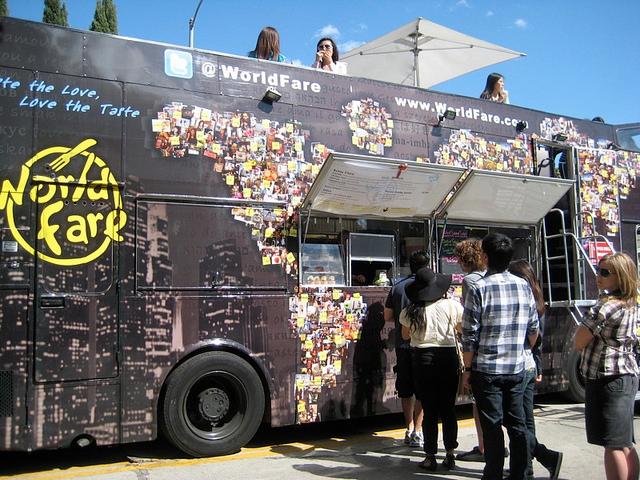America developing a serious taste for food trucks
The World Fare double decker “bustaurant” in Los Angeles. (Photo by Flickr user calamity_hane, cc-by-sa.)
Food trucks seem to be cropping up everywhere across America.
They’re on TV. They’re in parks. And, of course, they’re on streets in cities large and small. And these aren’t the food trucks of old.
Gone are the days of a food truck slinging greasy burgers and burritos to go at construction sites. Today’s food trucks have gone gourmet: lobster rolls, cupcakes and even gourmet grilled cheese sandwiches.
What’s the best food truck food you’ve ever had. Post your answer in the comments below so everyone else can give it a try!
Armenco, a food truck manufacturer in California, has been forced to double its annual output, just to keep up with demand from entrepreneurs looking to get into the business.
Richard Myrick, editor of Mobile Cuisine magazine, writes about everything food truck, including celebrity sightings at food trucks.
“The craze actually started during the beginning of the recessions. It was a means for culinary entrepreneurs to start up mobile restaurants at a quarter of the cost it takes to get into a storefront,” Myrick said.
But in many cities, those lower operating costs have traditional restauranteurs fighting tooth and nail to keep food trucks out of town. At the same time, a few restaurants are joining the craze by opening their own trucks.
“Most of the restaurants feel that food truck are unfair competition,” Myrick said. “For some reason, the restaurant owners think people are going to stop attending the restaurants to go to food trucks.”
Myrick said what’s more likely is food trucks are taking sales from fast food shops, like McDonalds or Burger King. But, in this case, you’re getting food from a chef, serving local products at inexpensive prices. And they’re often a fusion of different food styles. Take Kogi barbecue, a popular trend on food trucks.
“They took Korean food and mixed it with a taco. You’ve got a Korean barbecue in a taco so people can order it, walk away from the truck and continue eating,” Myrick said.
Local jurisdictions that do allow food trucks have implemented a number of restrictions on what they can and can’t do. Most require that the trucks be licensed with a commercial kitchen, where prep work can be done. The trucks must also be inspected.
In Chicago, they take the restrictions a step further. No cooking can be done on the truck itself.
“Food trucks in Chicago have to prepare all their food in a commercial kitchen. They package it, they label it with all of the ingredients, and then they can load it on their trucks in hot boxes or coolers,” said Myrick, who lives in Chicago.
In Boston, they’re required to have GPS devices so food inspectors can find them.
Myrick said one of the best food trucks meals he had actually came in Detroit, from the El Guapo food truck.
“The pork burrito they serve is absolutely fantastic,” he said.
Our coverage reaches millions each week, but only a small fraction of listeners contribute to sustain our program. We still need 224 more people to donate $100 or $10/monthly to unlock our $67,000 match. Will you help us get there today?
